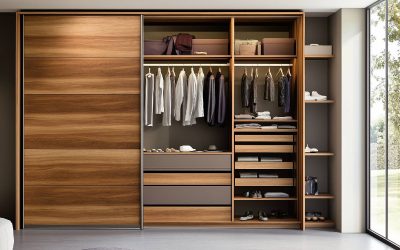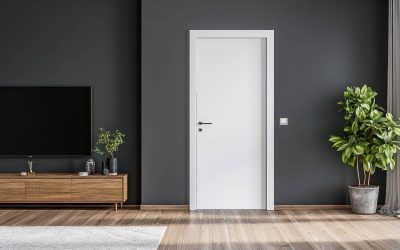
Passive House (Passivhaus)
Passive House design is becoming a popular choice for homeowners and architects in Scotland. Designed to reduce energy use, improve comfort, and lower carbon emissions, a Passive House is built around a few core principles – and one of the most important elements is choosing the right external doors.
At Finewood Doors in Falkirk, we often help customers who are building low energy homes or renovating with energy performance in mind. We’ll explain how external doors fit into the Passive House approach, what to look for in a door, and how to make smart choices that improve airtightness and insulation.
What is a Passive House?
Passive House (also known as Passivhaus) is a building standard developed in Germany that focuses on reducing energy demand, especially for heating and cooling.
Rather than relying on complicated systems to stay warm or cool, a Passive House keeps the temperature steady by using excellent insulation, airtight construction, high-performance windows and doors, and mechanical ventilation with heat recovery.
The main goals are of Passive House
To reduce energy use as much as possible
To keep indoor temperatures comfortable all year round
To maintain excellent air quality with low environmental impact
While it started in Europe, Passive House design has gained traction across the UK, especially in colder climates like Scotland. The principles can be used in new builds and renovations – and they’re not just for homes. Schools, offices, and other buildings can also be designed to meet Passive House standards.
Why Doors Matter in Passive House Design
When it comes to energy efficiency, external doors are just as important as walls, windows, and insulation. A poorly performing door can let in cold air, allow heat to escape, and cause condensation and draughts – all of which work against the Passive House goal.
Here’s why door choice matters
At Finewood Doors, we offer a wide selection of external doors that combine form and function so you can achieve energy savings without giving up on style or security.
Airtightness
Passive House buildings are extremely airtight. This means they stop uncontrolled air leaks, which are a major cause of energy loss in traditional homes. Every gap around a door, including between the frame and the wall needs to be sealed properly. Even small leaks can lead to heat loss and discomfort.
Good insulation keeps the warmth in and the cold out. External doors should have a strong thermal barrier, usually with an insulated core and a design that reduces thermal bridging (where heat travels through solid parts of the structure like metal hinges or frames).
Durability and Performance
A Passive House is designed to last. That means every element, including external doors, should maintain performance over time. Choose doors made from materials that can handle Scotland’s damp and windy weather and keep their insulating and airtight properties for many years.
While performance is key, your front door is also a major part of how your home looks and feels. Passive House doesn’t mean you have to compromise on appearance. Many high-performance doors are available in modern and traditional styles, with various finishes, glazing options, and secure locking systems.
Timber Doors and Passive House
Many customers come to Finewood Doors asking if timber doors are suitable for Passive House homes. The answer is yes but with some important conditions.
Timber is a natural insulator and offers excellent durability when properly treated. High-performance timber doors, especially those with engineered cores, can meet the necessary airtightness and insulation levels. Look for certified models or speak to our team about custom timber doors that can be adapted to suit low-energy projects.
Timber/aluminium hybrid doors are also a great option, offering the warmth and look of wood on the inside with a low-maintenance aluminium exterior.
What to Look for in a Passive House Ready External Door
Whether you’re working on a Passive House project or simply trying to make your home more energy efficient, here’s what to consider when choosing a door.
Check the manufacturer’s specifications. A U-value under 0.8 W/m²K is ideal for Passive House. For lower-budget renovations, aim for the best U-value you can afford, it will pay off in comfort and energy savings.
Look for doors with multiple weather seals or gaskets around the frame. A proper airtight seal is essential, especially in windy locations like Falkirk and the surrounding areas.
Many energy-efficient doors feature an insulated core made from rigid foam, timber, or a composite material. This adds thermal protection without increasing thickness.
The door frame is just as important as the door itself. A thermally broken frame helps stop heat loss and improves the overall energy rating of the door unit.
A well-designed threshold prevents draughts and water ingress. Low thresholds are ideal for accessibility but should still maintain airtightness and insulation.
Installation
Even the best performing door will underperform if it’s not installed correctly. Gaps between the frame and wall must be sealed properly with airtight tape or foam.
Passive House Door Certification
Not all doors used in Passive House homes are officially certified by the Passive House Institute but using a certified product does give peace of mind that it meets the standard.
If you’re aiming for full Passive House certification for your building, using a certified door will make the process easier. If not, you can still choose high-performance doors that follow the same principles and deliver most of the same benefits.
Speak to the Experts at Finewood Doors
At Finewood Doors in Falkirk, we’ve been supplying high-quality internal and external doors to customers across Scotland for over 30 years. We understand the growing demand for energy efficient products and can help you choose doors that support your sustainability goals.
Whether you’re designing a Passive House, upgrading a family home, or building a modern eco property, we’re here to guide you. Visit our Falkirk showroom or contact us online to discuss your project and get practical advice on door options that deliver on both performance and design.



